10 Life Lessons I learnt from the Blind students during my quest
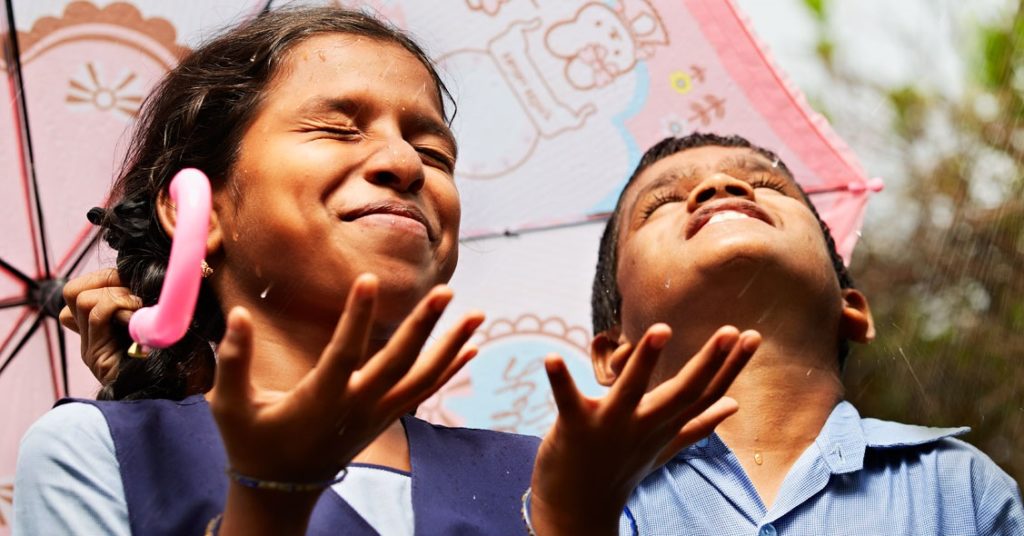
[ Originally posted in LinkedIn/pulse on December 11, 2018 ]
When I started my work for the blind students, I believed that I would be working for the destitute children who can’t even do their daily chores on their own.
But soon I realized I was wrong.
To my surprise, I found that these blind children were generally a lot happier and living more blissful life than us despite their impediments.
As I started observing them closely – their perspective, their attitude, their approach to their life’s challenges – I realized these children are much more mature, pragmatic, and balanced than us.
My interactions with them sure gave me an astounding experience and a bouquet of life lessons.
1. Don’t Complicate Your Life with Undue Expectations.
We unnecessary burden ourselves with too many expectations – many of those, we know very well, are beyond our means and capabilities – and then feel dispirited when we fall short.
But these Blind children have uncanny capability of tuning their expectations to what they are capable of.
I was enchanted when one of them said – “I know I can’t see colors of these fruits. But that’s fine. I can still differentiate them based on their tactile features.”
Another one quipped – “If I can’t enjoy a movie, I will enjoy the music instead.”
No cribbing, no grumbling!
2. Cherish Your Small Successes.
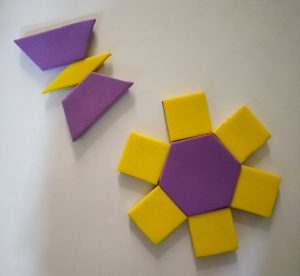 During one of my interactions, I gave a blind girl set of tactile geometrical figures. She picked a few pieces, arranged them, and then asked me – “Can you identify what I have made?”
During one of my interactions, I gave a blind girl set of tactile geometrical figures. She picked a few pieces, arranged them, and then asked me – “Can you identify what I have made?”
“It is a butterfly flying over a flower. Right?” – I said.
“Isn’t it beautiful?” – She gave a wide grin.
During another interaction, I gave a blind boy GEOMKIT (the Tactile Geometry Kit designed by me).
He drew a Circle using the kit, then moved his hand over it to feel the tactile impression, looked up with a broad smile beaming his face, and said, “See, I have made it, sir.”
I wonder, why don’t we also cherish our small-small successes like them.
3. Embrace Your Limitations.
A blind student once told me, “I am told a ripe apple is red, while an unripe one is green. But the problem is how do I select the ripe apples unless I taste it? That fruit vendor won’t let me taste until I buy it.”
Then he laughed, “That is why I like banana. At least I can pick the ripe ones by feeling it.”
I was amazed – how deftly was this young blind boy laughing away his impediment.
Incidentally, we all have limitations too. But we somehow tend to crib about it so much that we make it look as if our whole life has ceased because of it.
4. Hone Your Strengths.
One blind professor told me proudly – “You know, I boil the milk on stove daily myself and it has never spilled out.”
“How do you do that?”, I asked curiously.
“Actually, I have noticed that just before the milk boils, it makes a specific sound. I recognize that sound and put off the stove just in time.”
“But I haven’t heard that special sound.”
“Your eyesight has surely bombed your eardrums!” – he teased me with a grin.
We all have some strengths. Unfortunately, we focus so much on our weaknesses that we completely loose sight of our strengths.
5. Face Life’s Challenges Head-on.
For a blind person, life’s challenges are so many and are part of their daily chores. Yet I have rarely seen them avoiding them. On the contrary, I have seen them actively seeking and adopting new assistive devices and gadgets that help them overcome these challenges.
If the Cane is their life’s necessity, they don’t feel shy in using it – nor do they shy away from accepting an offer of help from others.
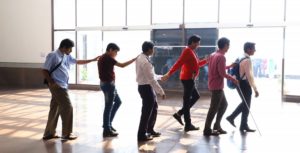
In contrast, most of us perceive seeking help as a sign of weakness. Incidentally, I have seen many among us refusing to use glasses even if they are fully aware that their eyesight is weak – similarly, many old people refusing to use a cane or wheelchair. The result – we continue living an impoverished life.
6. Be Child-like Curious Always.
I have seen most of the blind people love to try every new thing – new device, new gadget, new accessible technique. They would insist on trying it themselves, would explore whether it helps them in any way. They would seek information about it, provide their feedback openly and insist that it is improved to suit their needs. Once they find that it helps them in even a small way, they would lap it up.
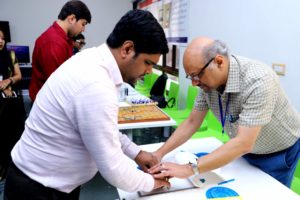
For them, every new thing is a new opportunity to achieve more small successes.
7. Live Life with Dignity.
Even while living a challenged life, these blind children do not like to compromise on their dignity.
They seek help – but they hate ‘pity’.
They seek new devices and gadgets – so that they become self-reliant.
They adopt new solutions and technologies just to say those golden words – “I can do it myself!”
8. Never Pity Yourselves.
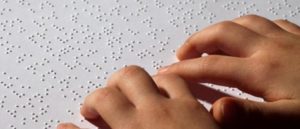 I was sitting with the blind professor and I was struggling to read the braille text that is made up of a sequence of embossed dot patterns.
I was sitting with the blind professor and I was struggling to read the braille text that is made up of a sequence of embossed dot patterns.
I was livid with myself, “I just can’t differentiate these braille dot patterns with my fingers. How do you read them so well?”
He smiled, “Reading Braille is not easy. It needs lots of practice and concentration,” – then grinned, “And needs sacrifices too! See, I have sacrificed my eyesight to hone this skill…!”
I laughed as loudly as he.
9. Choose Yourself to Be a Winner.
These blind students would talk about how they are better than their fellow blinds, what all they can do that their peers can’t. They won’t compare with sighted peers and feel dejected.
On the other hand, we have the tendency to compare ourselves with only those who are more successful than us, and then resent.
Moreover, why do we invariably set our bar so high that we fail to clear it?
10. Smile.
They smile…! And smile often!! A smile that is not forced, that is not fake. A genuine broad smile!
It makes their day!
It makes mine too!!

You may view my earlier post to know about my quest – Why I quit my Senior Management job at Adobe to work full-time for Blinds? .
You may also find details about my work towards this cause on my website ‘www.anupamkumargarg.com‘.
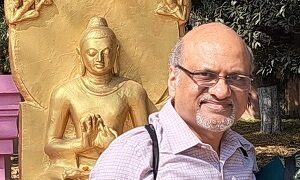
Leave a Reply